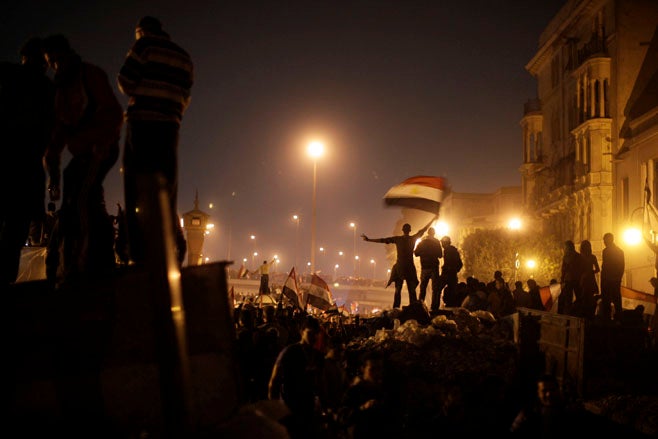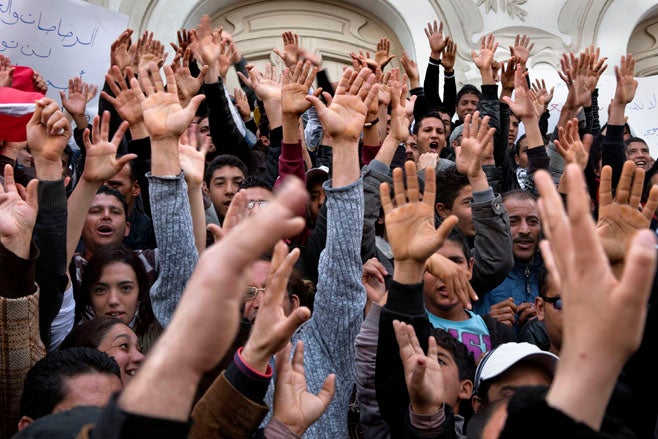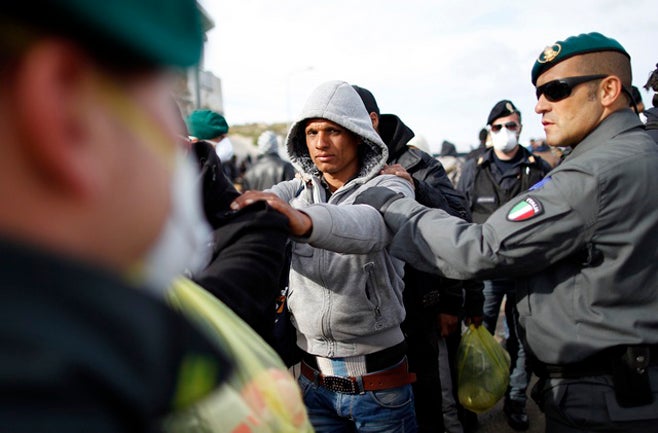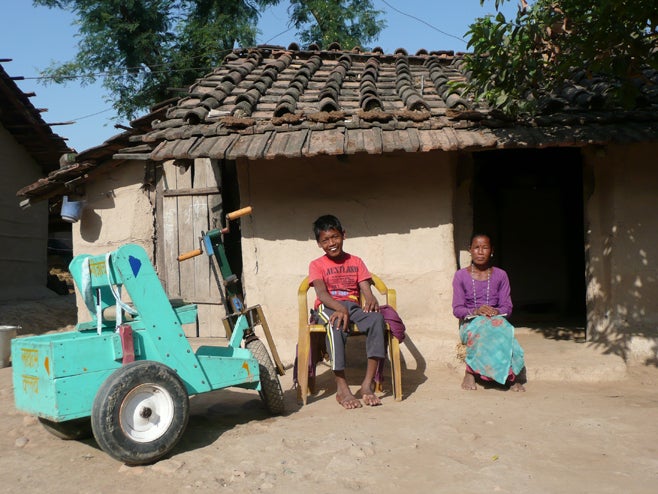Even as the EU and member states proclaimed the importance of human rights in the pro-democracy Arab Spring movements, they remained unwilling to prioritize human rights at home. Policy responses to migration from North Africa—including calls to limit free movement inside EU internal borders, disputes over rescuing boat migrants in peril, and reluctance to resettle refugees from Libya—exemplified this negative approach.
The European Commission failed to pursue vigorously its duty to enforce fundamental rights, dropping proceedings against Hungary over its media law and France over Roma expulsions, and suspending proceedings against Greece on its dysfunctional asylum and migration system despite continuing problems. The commission’s first annual report on rights inside the EU shied away from criticizing members states, with Fundamental Rights Commissioner Viviane Reding emphasizing that the Charter for Fundamental Rights was a “compass” rather than a “stick.”
Populist extremist parties remained strong across the EU, corroding mainstream politics especially on issues related to Roma, Muslims, and migrants. Governments frequently responded by echoing these parties’ criticism of minorities and pursuing policies that infringed human rights.
Common EU Asylum and Migration Policy
Upheaval in North Africa brought thousands of migrants and asylum seekers to European shores. The United Nations estimated that at least 1,400 people died crossing the Mediterranean in the first seven months of 2011, most as they tried to flee Libya. While rescue efforts—particularly by Italy and Malta—saved countless lives, poor coordination and disputes over where to disembark rescued migrants endangered others.
The Council of Europe (CoE) Parliamentary Assembly (PACE) initiated an inquiry in June into the deaths of boat migrants in the Mediterranean since January, following allegations that European and NATO warships ignored the plight of a boat in distress in late March or early April, leading to 63 deaths.
One hundred migrants rescued by a Spanish NATO warship spent five days at sea in July as Spain, Italy, and Malta refused to take them (Tunisia agreed). The dispute prompted concerns that NATO ships would be more reluctant to rescue migrants in the future. In August Italy accused NATO of forcing Italian coast guards to assist a boat in distress despite a NATO ship’s greater proximity.
With Tunisia and Egypt hosting hundreds of thousands displaced by the Libyan conflict, EU countries remained reluctant to help. As of September eight EU states had agreed to resettle fewer than 700 UN-recognized refugees from North Africa.
In June the European Commission presented proposals to revise the Reception Directive, which covers assistance to asylum seekers, and the Procedures Directive, which deals with asylum procedures. The proposals—which include broad grounds for detention, low standards on access to social assistance and healthcare, and expanded use of fast-track asylum procedures—remained subject to negotiation with the EU’s council and parliament at this writing. Amendments to the Qualification Directive, approved by the European Parliament in October, improved protection for victims of gender-related persecution and children. At this writing the council had yet to adopt the modified directive.
Legal proceedings in 2011 highlighted structural defects with the Dublin II Regulation, which generally requires that asylum claims be heard in the first EU state entered. Opposition from a majority of EU states blocked efforts to reform the regulation, which places a disproportionate burden on countries at the EU’s external borders.
In January the European Court of Human Rights (ECtHR) Grand Chamber ruled in MSS v. Belgium and Greece that Belgium’s transfer of an Afghan asylum seeker to Greece under the regulation exposed him to abusive detention conditions in Greece and denied him the chance to seek asylum. An advocate general of the Court of Justice of the European Union (CJEU) said in September, in another case involving a transfer to Greece, that an EU country must examine an asylum claim if return to the first country of entry would expose the individual to rights violations. The CJEU had not ruled on the case at this writing.
Also at this writing at least eight EU states were processing claims from asylum seekers who passed through Greece and a larger number had suspended returns to Greece.
The debate about whether to reinstitute internal border controls in the Schengen area—a free movement zone comprising 25 EU and other countries—sparked in part by a dispute between France and Italy over Tunisian migrants, raised concerns that EU member states might restore checks in a discriminatory way. France intensified document checks at and around the border with Italy in an apparent effort to identify Tunisian migrants coming from Italy. A police union revealed that an official notice in the Cannes central police station in February calling on officers to target Tunisians for such checks had been removed following protests.
Changes to the regulations governing Frontex, the EU’s external border agency, adopted in September and October made more explicit its duty to respect human rights in its operations, and established a rights officer post and a forum to consult civil society, but failed to create a mechanism to hold Frontex accountable for rights violations. Frontex border guards on the Greece-Turkey border were complicit in exposing migrants to abusive conditions in Greek detention centers.
The CJEU ruled in March that undocumented parents of children who themselves are EU citizens are entitled to reside and work in the EU. The court ruled in April that member states cannot impose prison terms on undocumented migrants for failing to leave the country when ordered.
Discrimination and Intolerance
The horrific terrorist attacks in Norway (not an EU state) in July underscored growing intolerance in Europe. One man killed 77 people—almost half of them children—and injured over 150 in two separate attacks on the same day. His writings betrayed extremist, xenophobic, and anti-Muslim views, echoing what has increasingly become mainstream debate in Europe.
In February United Kingdom Prime Minister David Cameron and French President Nicolas Sarkozy separately declared multiculturalism a failed policy. The CoE’s European Commission against Racism and Intolerance (ECRI) warned in June against rising racism with hateful discourse, discrimination against Muslims, and violence targeting migrants, refugees, and asylum seekers, calling anti-Roma sentiment one of the most acute problems in many European societies.
Laws banning women and girls from wearing full-face veils entered into force in France (April) and Belgium (July) amid criticism from Thomas Hammarberg, the CoE Commissioner for Human Rights, and human rights groups that these bans violate women’s rights, non-discrimination, personal autonomy, and freedom of religion and expression. The first two women to receive fines, in September, for violating the ban in France announced they would appeal. Italy moved closer to adopting similar nationwide legislation when a parliamentary committee endorsed a bill in August, while the Netherlands’s government proposed to adopt a ban on face-covering veils by 2013.
A June report by Hammarberg’s office found that homophobic and transphobic biases persist in public opinion, policies, and laws. The UK announced it would lift its lifetime ban on gay men donating blood. Only three other EU member states allow gay men to donate (Italy, Portugal, and Sweden). Germany’s Constitutional Court ruled in January that requiring transgender people to undergo sex reassignment surgery and irreversible sterilization to legally change their gender was unconstitutional. At least sixteen EU countries, including the Netherlands, have such requirements. The Dutch government submitted draft legislation in September to eliminate the requirement.
Eleven EU countries were among the first to sign a CoE convention on preventing and combating violence against women and domestic violence adopted in May. The convention requires measures to prevent violence, protect victims regardless of legal status in the country, and prosecute perpetrators.
In June the CoE Venice Commission rejected proposals to amend its official position on the political participation of persons with intellectual or mental disabilities by removing undue restrictions on their right to vote. This position violates the binding UN Convention on the Rights of Persons with Disabilities, which has been ratified by 17 EU member states and the EU itself.
Counterterrorism Measures and Human Rights
Accountability remained elusive for complicity by EU countries in CIA rendition and secret prison programs. In January Lithuania’s prosecutor general closed the investigation into secret CIA prisons in that country, one year after it began. In September Hammarberg criticized continuing failure to determine responsibilities in Romania, Poland, and Lithuania. In a resolution adopted in October PACE expressed concern about the use of state secrecy doctrine to undermine or impede appropriate parliamentary oversight of intelligence services and investigations into unlawful acts.
Human Rights Concerns in Select EU Member States
France
Expulsions of Eastern European Roma continued, with a June immigration law increasing certain procedural safeguards while also allowing expulsions for “abusing” the right to short-term stay as EU citizens. Despite evidence of continued discriminatory targeting of Roma, the European Commission said in August it was satisfied with France’s response to its concerns.
In April France’s Council of State (highest administrative court) ruled that an August 2010 Ministry of Interior circular (later withdrawn) telling police to prioritize the dismantling of unlawful Roma settlements was discriminatory.
The June immigration law weakened the rights of migrants and asylum seekers, expanding the use of so-called transit zones—where they have fewer rights and can be easily deported—to detain individuals. The maximum detention period pending deportation was increased to 45 days, with judicial review delayed for five days after placement in detention.
The same law allowed the government to detain foreign terrorism suspects for up to six months, including in cases where deportation is blocked because of the risk of torture or ill-treatment upon return. The Constitutional Council struck down the government’s attempt to increase such detention to up to 18 months. The ECtHR ruled in September that France could not deport an Algerian to his home country because of the risk he faced of torture or ill-treatment.
Following civil society pressure and several binding court rulings, legal changes enacted in April increased safeguards in police custody, including notification of the right to remain silent and to have a lawyer present during questioning. However private client-lawyer conferences are still limited to 30 minutes, and authorities can still delay the presence of a lawyer in certain circumstances. The changes left in place exceptional rules for terrorism and organized crime suspects, who can be held for up to 72 hours without access to a lawyer.
Germany
In August Rheinland-Pfalz became the sixth state to grant freedom of movement to asylum seekers. In the 10 other states asylum seekers must stay within a circumscribed geographic area, with violation punishable by fines or prison. The UN Committee on Economic, Social and Cultural Rights (CESCR) expressed concern in July over inadequate social benefits, housing, access to employment, and healthcare for asylum seekers.
In September the parliament adopted a law exempting school personnel from the obligation to report undocumented migrants. Efforts by opposition parties to extend the exemption to health care and labor court personnel failed. In July the CESCR urged Germany to strengthen efforts to address obstacles facing people with a migration background in education and employment.
In October parliament renewed counterterrorism legislation for another four years and established an independent monitoring commission. The legislation permits extensive surveillance and data mining. In December 2010 a Cologne court dismissed Khaled el-Masri’s case against the German government for failing to pursue the extradition of 13 United States citizens allegedly involved in his rendition to Afghanistan in 2004.
In October the UN Working Group on Arbitrary Detention expressed concern over the preventive detention of individuals deemed dangerous, a regime the German Constitutional Court ruled unconstitutional in May. Germany faced questions in November from the UN Committee against Torture (CAT) on the use of diplomatic assurances and the deportation of unaccompanied migrant children.
Greece
Critical problems with the asylum system persisted, despite an official increase in the refugee recognition rate to 12.35 percent (including appeals) in the first seven months of the year. Access to asylum and review of claims at first instance remained problematic, with the new asylum service—created in a January law—expected to become fully operational only in 2012. Organizational and technical problems hampered the work of appeals committees established to tackle the backlog, which the government calculated in September at 38,000.
Migrants and asylum seekers, including women and families with children, continued to be detained in inhumane conditions. There was a chorus of criticism of migrant detention conditions in Greece, including in March by the EU Fundamental Rights Agency, the CoE Committee for the Prevention of Torture (CPT), and CoE Secretary General Thorbørn Jagland.
Numerous countries expressed concern about the situation of migrants, refugees, and asylum seekers in Greece during its Universal Periodic Review at the UN Human Rights Council (HRC) in May and urged Greece to take effective measures, including prosecution against discrimination, racism, and xenophobia.
Racist violence in Athens was a serious problem. ThePakistani Community of Greece documented attacks on 60 Pakistani men in the first three months of 2011. Far-right extremists rampaged through immigrant neighborhoods in May, leaving at least 25 people hospitalized with stab wounds or severe beatings. Two men and one woman were due to stand trial in December for the September assault and serious injury of a 24-year-old asylum seeker.
There were frequent demonstrations and strikes against austerity measures during the year, with fears that cuts to wages, pensions, and social spending are disproportionately affecting the poor, persons with disabilities, the elderly, migrants, and ethnic minorities.
The Athens prosecutor’s office opened an investigation in July into allegations of excessive and indiscriminate police use of force, including tear gas, during a June protest. The investigation was ongoing at this writing. A police officer was arrested in October for assaulting a news photographer at an anti-austerity rally the same month.
In March the Ombuds Institute published a damning report on abuses against children with disabilities at the Children’s Care Center of Lechaina, including the use of cage beds, tying children to their beds, and routine sedation. As of September the number of staff at the center had increased, but concerns persisted about conditions and treatment.
Roma continued to face systemic discrimination in housing and education. In March the ECtHR agreed to examine a school segregation case brought by 140 Roma children and parents. Greek authorities failed to implement a 2008 ECtHR ruling on school segregation involving the same families.
Hungary
A widely criticized media law, which undermines freedom of expression entered into force on January 1, the day Hungary assumed the EU presidency. Amendments adopted in March left in place the most significant problems, including overly broad and vague restrictions on media reporting with violations punishable by large fines, and regulatory powers in the hands of government-appointed bodies.
A new constitution was adopted in April. Drafted by the ruling Fidesz party, it contains provisions that discriminate against women; lesbian, gay, bisexual, and transgender (LGBT) people; and people with disabilities. In June the CoE’s Venice Commission criticized the lack of consultation with civil society and recommended amendments. The constitution goes into effect in January 2012.
Migrants from third countries entering Hungary through Ukraine continued to be returned across the border despite evidence of ill-treatment in Ukraine, in some cases after their pleas to seek asylum in Hungary were allegedly ignored. Legislation adopted in December 2010 increased maximum immigration detention to twelve months, and permitted extended detention for asylum seekers.
Roma faced harassment and threats from vigilante groups in rural areas. In April the Hungarian Red Cross evacuated 277 Roma from a settlement after an anti-Roma vigilante group threatened to conduct “military” training nearby. Four men stood trial in March for killing six Roma and injuring ten others during attacks between July 2008 and August 2009. The verdict was pending at this writing.
During Hungary’s Universal Periodic Review at the HRC in May, numerous countries recommended action against discrimination based on gender and sexual orientation, and to improve minority rights, in particular of Roma, including by combating hate crimes.
Italy
Over 55,000 boat migrants, including at least 3,700 unaccompanied children, reached Lampedusa, a small Italian island in the Mediterranean, from North Africa in the first seven months of the year. Reception centers on Lampedusa were periodically overwhelmed, with enduring concerns about the procession of asylum claims and conditions there and elsewhere in Italy, including for women and unaccompanied children. A fire allegedly set by Tunisians destroyed most of a detention center on the island in September, leading the government to declare Lampedusa an unsafe port. International and national organizations, including the Office of the UN High Commissioner for Refugees (UNHCR) and PACE, expressed concern that this could delay rescue operations.
As many as 12,000 Tunisians who arrived before April 5, when Italy signed a bilateral agreement with the new Tunisian government, received temporary visas. Those who arrived later were detained, pending deportation, in poor conditions following procedures that lacked sufficient safeguards.
Hundreds spent up to five days in detention on boats after the fire at the Lampedusa center before being transferred to other detention facilities or deported. In August an Italian navy ship intercepted around 100 migrants in international waters and transferred them to a Tunisian vessel, in what appeared to be an unlawful pushback.
All those arriving from Libya, primarily sub-Saharan Africans, applied for asylum, with many placed in specially created reception centers. In August the Italian interior minister estimated that 35 to 40 percent would be granted asylum, with the rest ordered to leave Italy or forcibly removed.
Italy signed an immigration cooperation agreement with the Libyan National Transitional Council in June, including the repatriation of undocumented migrants. At this writing there had been no returns to Libya in 2011. In June the Grand Chamber of the ECtHR heard a case involving the pushback by Italy of 24 Africans to Libya in May 2009, but had yet to rule at this writing.
In September an appeals court acquitted two Tunisian boat captains of charges stemming from their 2007 rescue and transfer to Lampedusa of 44 boat migrants in defiance of Italian authorities.
The ECtHR ruled in April that Italy’s 2009 expulsion of Ali Ben Sassi Toumi to Tunisia, in breach of its order to suspend removal, had violated the ban on returns to risk of torture, rejecting Italy’s argument that diplomatic assurances from Tunisia mitigated the risk.
In July the lower house of parliament rejected draft legislation that would have extended hate crime provisions to protect LGBT persons.
The UN Committee on the Elimination of Discrimination against Women communicated in July its deep concern about a range of issues affecting women in Italy, including multiple forms of discrimination and vulnerability to violence facing migrant and Roma women in particular. In September Hammarberg expressed concern about racist and xenophobic political discourse, particularly targeting Roma and Sinti, and called on Italian authorities to improve their response to racist violence. He criticized ongoing emergency powers leading to serial evictions of Roma camps.
In October the UN Committee on the Rights of the Child expressed concern about discrimination against Roma children in enjoyment of the rights to health, education, and an adequate standard of living, as well as reports of overrepresentation of Roma and foreign children in the juvenile justice system.
The Netherlands
In February the government narrowed the right of some asylum seekers to a suspensive appeal. In July it announced that rejected asylum seekers and irregular migrants should be forced to bear all costs for their forced return and narrowed the right to a suspensive appeal in certain cases.
In August an appeals court reaffirmed that Turkish nationals should be exempt from the in-country integration test required for long-term residency. In September the government said that Turkish migrants are no longer required to pass integration tests before immigrating to the Netherlands.
In September the Dutch government announced plans to introduce stricter requirements for family reunification, impose fines or prison for unauthorized stay, and make it easier to deport non-EU foreigners who commit a crime. In a move that could discourage domestic violence victims from reporting abuse, the plans also increase from three to five years the period women migrants must remain with their husbands before they can seek residency independently. Under the proposals family members of recognized refugees would be exempt from having to claim asylum. At this writing the measures had yet to be presented to parliament.
While NGOs applauded a March central government decision to end detention of unaccompanied migrant children, local authorities criticized a separate central government decision, effective in July, to sever all financial and housing support once they turn 18-years-old.
Geert Wilders, leader of the Freedom Party, was acquitted in June of charges of inciting hostility or discrimination against Muslims, non-Western immigrants, and Moroccans. The prosecutor had recommended the charges be dismissed on free expression grounds. But the finding of the Dutch court that, as a politician, Wilders had greater latitude than members of the public to express inflammatory ideas appeared at odds with ECtHR jurisprudence on free speech.
Poland
In May the prosecutor general replaced the lead prosecutor investigating allegations of Polish government complicity in CIA secret detention on Polish soil. A leading newspaper alleged that the replacement had political motivations. An investigation was ongoing at this writing.
New anti-discrimination legislation went into effect in January, despite criticism from civil society that it offers inadequate protection for sexual orientation, gender identity, and disability. A cut in the budget of the office of the ombudsperson for civil rights, whose mandate is expanded by the new law, prompted it to call for the law to be suspended on the grounds that it cannot perform its new functions with reduced resources.
Poland continued to have one of the most restrictive abortion laws in Europe. In May the ECtHR ruled in the case RR v. Poland that the denial of access to genetic pre-natal testing and a legal abortion amounted to a violation of the prohibition on cruel and inhuman treatment, as well as a violation of the right to privacy and family life. Draft legislation to impose a total ban on abortions was narrowly defeated in parliament in August.
Spain
Widespread protests against austerity measures began in May, with occupations of squares in several cities. There were credible reports of excessive use of force by police in dispersal operations in Madrid and elsewhere between May and August. Accusations of excessive force also marred a protest against the Pope’s visit to Madrid in mid-August.
New immigration regulations in June ensured that undocumented migrant women who report domestic violence do not risk immediate expulsion. The rules make it easier for parents of children with Spanish citizenship to obtain residency permits, facilitate residency for unaccompanied migrant children at 18-years-old, and create a presumption in age-dispute cases that the individual is a child. The Ombuds Institute nonetheless criticized age-determination practices in September and recommended procedural reforms.
In February ECRI expressed continuing concerns about insufficient application of criminal provisions to combat racially motivated crimes, inadequate data collection on racism and discrimination, and ethnic profiling of migrants by police. The UN Committee on the Elimination of Racial Discrimination (CERD) echoed these concerns in April. A comprehensive government-proposed non-discrimination bill was before parliament at this writing.
In March the CPT repeated its call for reform of incommunicado detention for suspects of serious crimes such as terrorism, including access to a lawyer from the outset of detention and the right to examination by a doctor of choice. In July the Ombuds Institute also recommended improving safeguards in incommunicado detention.
Spain extradited Belgian-Moroccan citizen Ali Aarrass to Morocco in December 2010 to face terrorism charges, despite a binding order from the CAT in November to suspend extradition while it examined the case.
In October 2011 the violent Basque separatist group ETA announced it would give up its 43-year armed struggle.
United Kingdom
Rioting in early August in London, Manchester, Liverpool, and elsewhere across the UK, triggered by death of a man in north London shot by the police, led to five deaths and over 3,000 arrests, including hundreds of children. An investigation into the shooting was ongoing at this writing.
Penal reform groups and a former chief prosecutor expressed concern about the severity of sentencing in some riot-related cases, including of children. In October an appeals court upheld seven riot sentences, including the widely criticized four-year terms for inciting riot on Facebook, and reduced three others.
CERD urged the government in October to thoroughly investigate the underlying causes of the rioting, and ensure that policy responses do not disproportionately affect minorities.
A commission appointed in May to review the domestic Human Rights Act had yet to report at this writing. The act faced renewed criticism from the prime minister and home secretary.
Correspondence between the government of former Libyan leader Muammar Gaddafiand British intelligence discovered in Libya in September indicated British involvement in rendition to Libya, underscoring the need for an effective inquiry into UK complicity in rendition and overseas torture.
In August NGOs and victims’ lawyers withdrew their cooperation with the government-established inquiry set up for that purpose on the grounds that government-imposed conditions announced in July, including limits on questioning witnesses and government control over disclosure, made an effective process impossible. At this writing the inquiry had yet to begin.
In July the ECtHR affirmed the extra-territorial application of the European Convention on Human Rights, ruling that the UK had both arbitrarily detained an Iraqi civilian for over three years in a British-run detention center in Iraq, and had failed to conduct independent and effective investigations into the deaths of five Iraqis apparently killed by British soldiers in Iraq.
In September a three-year public inquiry found a British military regiment responsible for the 2003 death in custody of Iraqi civilian Baha Mousa after being subject to inhuman and degrading treatment and sustaining multiple injuries. The inquiry recommended comprehensive steps against hooding and stress techniques in detention, as well as independent inspection of battlefield detention centers. Another inquiry into allegations that up to 20 men were tortured and murdered in British custody in southern Iraq in 2004 had yet to begin at this writing.
Four counterterrorism bills that the government tabled in February, May, and September were under parliamentary scrutiny at this writing. Terrorism pre-charge detention limits would be reduced from 28 to 14 days, but with the option of a new 28-day emergency power, drawing criticism from the parliamentary human rights committee.
Control orders would also be limited in severity and duration, but again with the option of restoration in exceptional circumstances. Inadequate judicial safeguards and the use of secret evidence remained. Terrorism stop and search without suspicion will also be permanently limited, although the risk of misuse remains.
Children continued to be detained with family members pending deportation despite a 2010 government pledge to end the practice.






